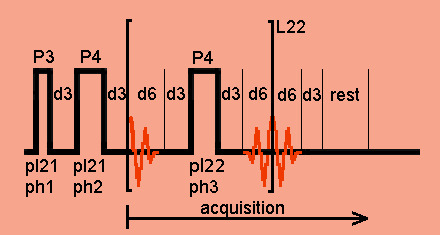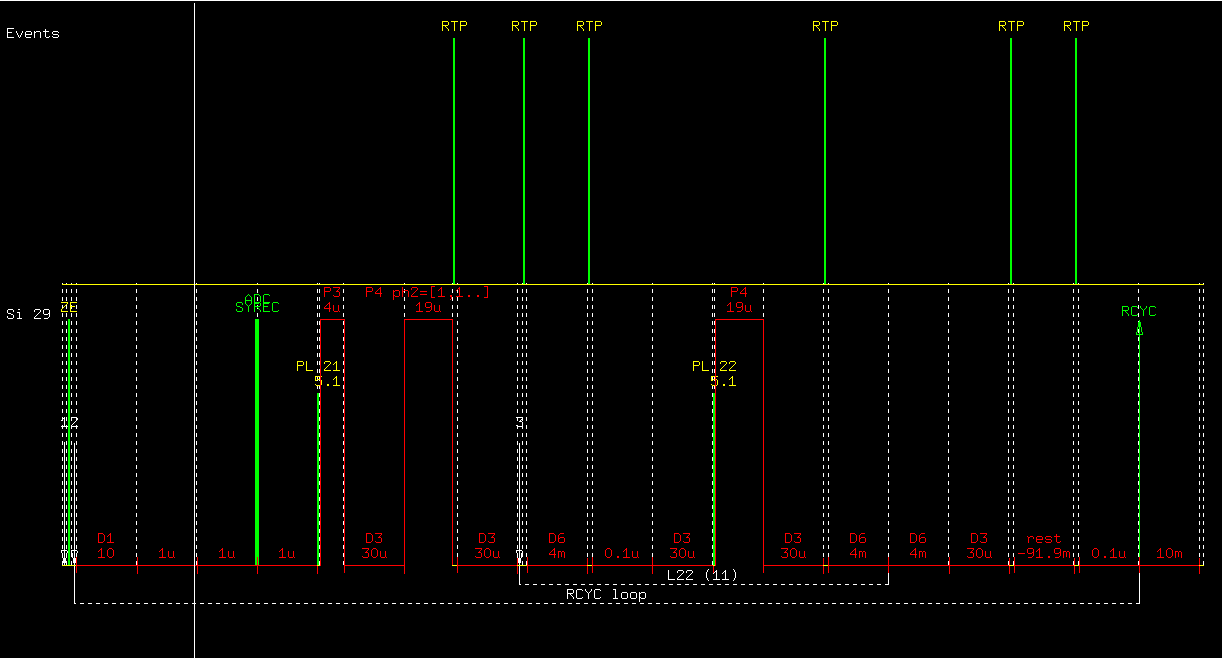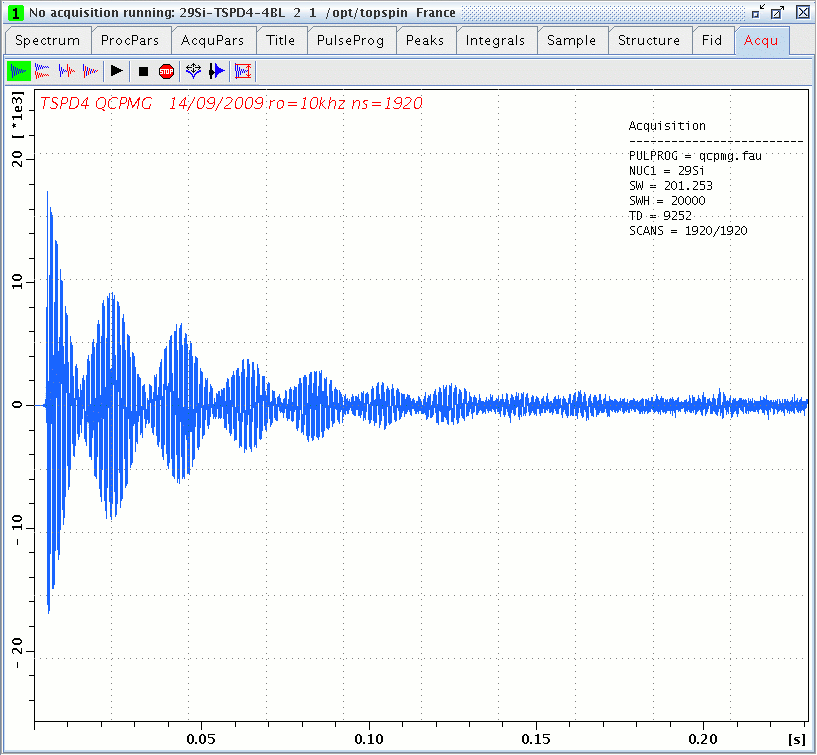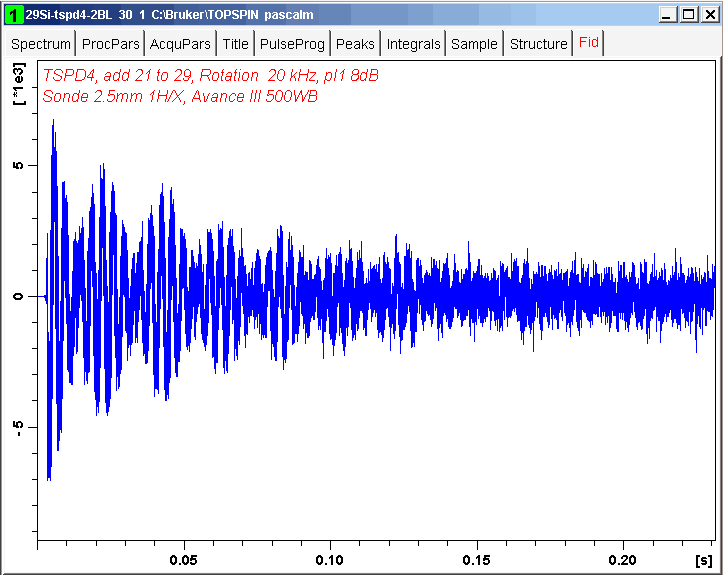
QCPMG pulse program for topSpin2.1 operating system

; qcpmg (TopSpin 2.0) ; AVANCE III ; FAU, 09/05/2007 ; written by Stefan Steuernagel ; use rotor-synchronized CPMG train of refocusing pulses to create the echoes ; pulse program for quadrupolar CPMG sequence ; samples continuously, including ALL pulses and ringdown delays ; may be used with digmod digital ; important: only runs via SGU in channel 1 ;parameters: ;ns : 16 * n ;d1 : recycle delay ;d3 : time to allow pulse ringdown, 10 to 100 us ;d6 : enter duration of FID ;pl1 : =120 dB, not used ;pl21 : RF power level ;pl22 : =pl21 usually, =120 dB if 180° pulses are not desired ;p3 : 90 degree pulse ;p4 : 180 degree pulse ;p25 : dummy pulse, used for showing cnst1 in ased ;l22 : # of echos to be acquired ;cnst1 : set td to number of acquired complex data points ;$COMMENT=quadrupolar CPMG sequence, samples continuously, pulses blanked out, requires DRU ;$CLASS=Solids ;$DIM=1D ;$TYPE=half integer quadrupoles ;$SUBTYPE=simple 1D ;$OWNER=fabien #include <Avancesolids.incl> ; "p4=p3*2" "cnst1=((d6*2+d3*2+p4)*l22+d6+d3)/dw" "p25=cnst1" define delay rest "rest=aq-(cnst1*dw)" ;cnst11 : to adjust t=0 for acquisition, if digmod = baseopt "acqt0=1u*cnst11" 1 ze ;clear data 2 d1 ;relaxation delay STARTADC RESETPHASE (p3 pl21 ph1):f1 d3 (p4 ph2):f1 d3 DWL_CLK_ON ;start acquisition 3 d6 RG_ON 0.1u RG_OFF d3 (p4 pl22 ph3):f1 d3 d6 RG_ON lo to 3 times l22 ;next echo d6 d3 rest RG_OFF 0.1u DWL_CLK_OFF ;stop acquisition rcyc=2 ;next scan 10m wr #0 ;save data exit ;two coherence transfert pathways are selected: ;0Q -> (+1Q, -1Q) -> (-1Q, +1Q) -> ... -> -1Q ph0=0 ph1=0 2 ph2=1 1 3 3 ph3=1 1 1 1 3 3 3 3 ph30=0 ph31=2 0 ;one coherence transfert pathway is selected depending ;on the number L22 of observed echos: ;either 0Q -> +1Q -> -1Q -> ... -> -1Q if L22 is even ;or 0Q -> -1Q -> +1Q -> ... -> -1Q if L22 is odd ;ph0=0 ;ph1=0 1 2 3 ;ph2=1 0 1 0 3 2 3 2 1 0 1 0 3 2 3 2 ;ph3=1 0 1 0 3 2 3 2 3 2 3 2 1 0 1 0 ;ph30=0 ;ph31=2 3 0 1

Graphic representation associated with the TopSpin2.1 qcpmg.fau pulse program.

29Si echo train of TSP-d4 in 4 mm diameter rotor spinning at 10 kHz.
Acquisition parameters:
| General | |
| PULPROG | qcpmg.fau |
| TD | 9252 |
| NS | 1920 |
| DS | 0 |
| SWH [Hz] | 20000.00 |
| AQ [s] | 0.2313500 |
| RG | 114 |
| DW [µs] | 25.000 |
| DE [µs] | 6.50 |
| const1 | 9251.456055 |
| CONST11 | 0.0000000 |
| D1 [s] | 30.00000000 |
| D3 [s] | 0.00005000 |
| D6 [s] | 0.01000000 |
| L22 | 11 |
| P25 [µs] | 0.00 |
| rest [s] | 0.00006360 |
| Channel f1 | |
| NUC1 | 29Si |
| P3 [µs] | 3.00 |
| P4 [µs] | 12.40 |
| PL1 [dB] | 120 |
| PL1W [W] | 0.00000000 |
| PL21 [dB] | 6.00 |
| PL21W [W] | 130.4819793 |
| PL22 [dB] | 6.00 |
| PL22W [W] | 130.4819793 |
| SFO1 [MHz] | 99.3774009 |

29Si echo train of TSP-d4 in 2.5 mm diameter rotor spinning at 20 kHz.
Acquisition parameters:
| General | |
| PULPROG | qcpmg.fau |
| TD | 9252 |
| NS | 360 |
| DS | 0 |
| SWH [Hz] | 20000.00 |
| AQ [s] | 0.2313500 |
| RG | 512 |
| DW [µs] | 25.000 |
| DE [µs] | 6.50 |
| const1 | 9250.399414 |
| CONST11 | 0.0000000 |
| D1 [s] | 180.0000000 |
| D3 [s] | 0.00005000 |
| D6 [s] | 0.01000000 |
| L22 | 11 |
| P25 [µs] | 0.00 |
| rest [s] | 0.00009002 |
| Channel f1 | |
| NUC1 | 29Si |
| P3 [µs] | 5.00 |
| P4 [µs] | 10.00 |
| PL1 [dB] | 120 |
| PL1W [W] | 0.00000000 |
| PL21 [dB] | 8.00 |
| PL21W [W] | 82.32855988 |
| PL22 [dB] | 8.00 |
| PL22W [W] | 82.32855988 |
| SFO1 [MHz] | 99.3782330 |